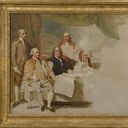Exclusive interview: Ken Burns previews new Ben Franklin documentary

A new Ken Burns documentary, "Benjamin Franklin," premieres Monday and Tuesday night at 8/7c on PBS. The two parts run a total of four hours. I interviewed Burns from his farmhouse in Walpole, N.H..
"He's on the hundred-dollar bill for a reason," Burns said. "He has represented to nearly every generation of Americans since our founding a sort of striving — of pulling yourself up by your bootstraps, a kind of libertarian view of how you advance in America, this poor kid from Boston who makes it."
- "What's missing from that portrait [are] some significant flaws on his part, and his attempt to address those flaws all his life."
"He's the greatest American inventor of the 18th century, and he didn't hold any patents. He felt that these were for the common good."
- "He creates this collection of leather-apron guys — kind of middle class, which he thinks is the backbone of America, and they get together for civil discourse about all ranges of questions. He starts the first free lending library. He starts the first philosophical society in the United States. He controls all the social media, right?"
- "He's a printer, he's a publisher, he's a postmaster, he prints currency and the acts of government. ... He's our first humorist."
- "And all of it is built on Socratic questions. First to yourself: How do I improve myself? And then to society: How do we make it better?"
"Decades before the revolution," Burns continued, "he understands that there is this new thing that he perceives — a unified, united states. ... No him? No us — no U.S."
- "He is an arc. ... And his greatest invention is himself. He's always into self-improvement. He always is measuring himself.
- "And at the end of his life, he's realized that he's printed ads selling human beings. He's realized he's printed ads offering rewards for runaway human beings. ... And he wants to balance it out. He wants to be a good person."
And Burns tells that story with, of course, no footage or photographs of his subjects.
- Watch the 30-sec. trailer ... 1 hour video, "Franklin and Diplomacy," presented by WETA and Georgetown University.